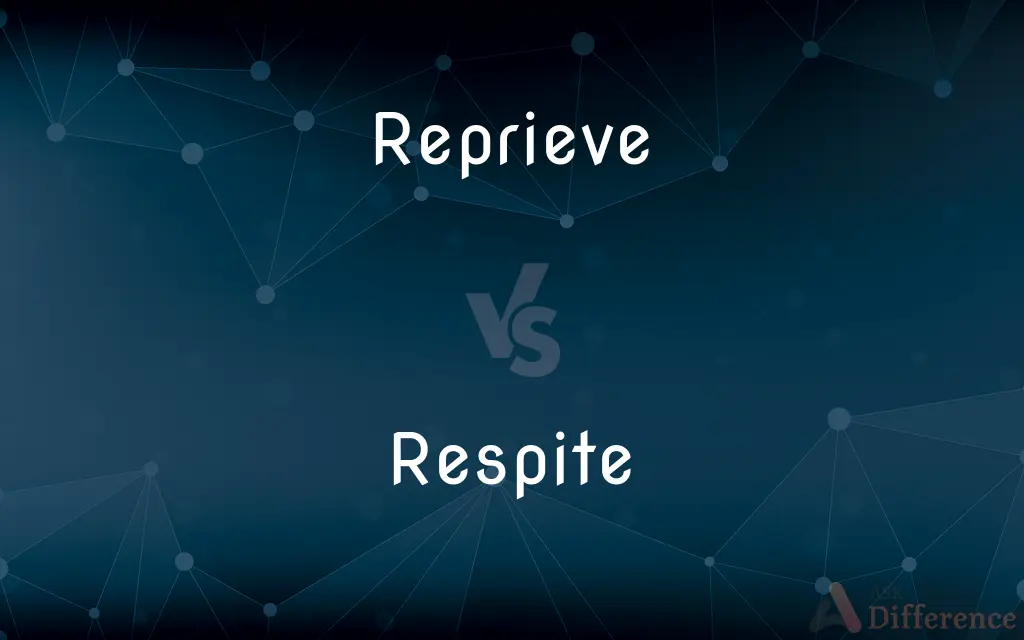Reprieve vs. Respite — What's the Difference?
By Maham Liaqat & Fiza Rafique — Updated on April 2, 2024
A reprieve is a temporary relief from or postponement of a punishment, often used in legal contexts, whereas respite refers to a short period of rest or relief from something difficult or unpleasant.

Difference Between Reprieve and Respite
Table of Contents
ADVERTISEMENT
Key Differences
Reprieve primarily carries a legal connotation, referring to the temporary suspension of a penalty. It acts as a form of temporary relief granted by a competent authority, often in the context of judicial or executive clemency. On the other hand, respite is a broader term that can apply to any short period of relief from distress, hardship, or exertion, without the specific legal implications of a reprieve. Respite can be sought or provided in various situations, such as caregiving, work, or emotional stress, offering a pause that helps individuals recover or regroup.
While a reprieve is specifically associated with the deferment of punishments, offering a temporary halt to execution or enforcement, respite denotes a pause that brings temporary relief from any kind of stress or difficulty. The concept of reprieve is thus narrower and more formal, often involving official or legal processes, whereas respite is more widely applicable in everyday contexts and can be informal or self-initiated.
Reprieves are granted through official channels, such as by a government official or a court, highlighting its formal nature and its application in serious circumstances, typically to delay a legal penalty. Respite, conversely, may come in the form of a break from work, a vacation, or simply a quiet moment, emphasizing its role in providing psychological or physical rest.
The duration of a reprieve is often determined by the authority granting it and is specific to the context of the punishment, whereas the duration of a respite is variable and can be determined by the needs or situations of the individuals involved. Both reprieve and respite serve the purpose of offering temporary relief, but they differ significantly in their application, scope, and the processes through which they are granted.
While both terms deal with the concept of temporary relief, the contexts and manners in which they are employed distinguish them. Reprieve is reserved for formal, often legal, contexts of delaying punishment, whereas respite encompasses a wider range of situations where a break or relief from various forms of stress and hardship is sought.
ADVERTISEMENT
Comparison Chart
Definition
Temporary suspension of a punishment, especially a legal penalty.
A short period of relief or rest from something difficult or unpleasant.
Context
Primarily legal, related to judicial or executive decisions.
Broad, applicable in various everyday situations.
Purpose
To delay enforcement of a penalty, often for further review or clemency.
To provide a break or relief from stress, hardship, or exertion.
Process
Granted through official channels, such as courts or governmental authorities.
Can be self-initiated or provided by others, without formal procedures.
Duration
Determined by the authority granting it, with a specific context.
Variable, often determined by personal need or situation.
Examples
A death row inmate receiving a reprieve hours before scheduled execution.
Taking a vacation to get respite from work-related stress.
Compare with Definitions
Reprieve
Official suspension of a sentence.
The court's reprieve halted the penalty while new evidence was considered.
Respite
A break from work or activity.
The weekend offered a much-needed respite from the hectic work schedule.
Reprieve
Legal clemency action.
A reprieve can offer a last-minute chance to avoid a death sentence.
Respite
Temporary relief from stress.
The short vacation provided a respite from the stress of daily life.
Reprieve
A delay in executing a legal penalty.
The governor granted a reprieve to the convict, postponing the execution.
Respite
A pause for rest.
The caregiver took an afternoon off for some respite.
Reprieve
A temporary relief from punishment.
The reprieve allowed the prisoner a chance to appeal for a new trial.
Respite
A momentary cessation of difficulty.
The rain stopped, giving respite to the outdoor event.
Reprieve
A postponement of judicial consequences.
The reprieve gave the family hope for a reconsideration of the case.
Respite
Relief from caregiving duties.
The family hired help to give themselves some respite from 24/7 caregiving.
Reprieve
To prevent or suspend the punishment of (someone, especially a convicted criminal).
Respite
A usually short period of rest or relief.
Reprieve
To prevent or suspend (a punishment).
Respite
Temporary suspension of the execution of a sentence.
Reprieve
To bring relief to
The rain reprieved us from the noise of the construction machinery.
Respite
Forbearance or delay, as granted in the payment of a debt.
Reprieve
To prevent the imposition of a scheduled or expected punishment, especially temporarily.
Respite
To delay (a legal sentence, for example); postpone.
Reprieve
The prevention or suspension of a scheduled or expected punishment.
Respite
To grant a respite to (someone).
Reprieve
A court order or other official notification preventing or suspending a scheduled or expected punishment.
Respite
Relating to or being a respite
Respite care.
Reprieve
Temporary relief, as from danger or pain.
Respite
A brief interval of rest or relief.
Reprieve
(transitive) To cancel or postpone the punishment of someone, especially an execution.
Respite
(legal) The delay of appearance at court granted to a jury beyond the proper term.
Reprieve
(transitive) To bring relief to someone.
Respite
(musical theatre) A short period of spoken dialogue in an otherwise sung-through musical.
Reprieve
To take back to prison (in lieu of execution).
Respite
(transitive) To delay or postpone (an event).
Reprieve
To abandon or postpone plans to close, withdraw or abolish (something).
Respite
(transitive) To allow (a person) extra time to fulfil some obligation.
Reprieve
The cancellation or postponement of a punishment.
The prisoner was saved from execution; the governor had requested a reprieve.
Respite
A putting off of that which was appointed; a postponement or delay.
I crave but four day's respite.
Reprieve
A document authorizing such an action.
Respite
Temporary intermission of labor, or of any process or operation; interval of rest; pause; delay.
Some pause and respite only I require.
Reprieve
Relief from pain etc., especially temporary.
Respite
Temporary suspension of the execution of a capital offender; reprieve.
Reprieve
A cancellation or postponement of a proposed event undesired by many.
Respite
To give or grant a respite to.
Forty days longer we do respite you.
Reprieve
To delay the punishment of; to suspend the execution of sentence on; to give a respite to; to respite; as, to reprieve a criminal for thirty days.
He reprieves the sinnner from time to time.
Respite
To relieve by a pause or interval of rest.
Reprieve
To relieve for a time, or temporarily.
Company, thought it may reprieve a man from his melaneholy yet can not secure him from his conscience.
Respite
A (temporary) relief from harm or discomfort
Reprieve
Interval of ease or relief; respite.
All that I ask is but a short reprieve,ll I forget to love, and learn to grieve.
Respite
A pause from doing something (as work);
We took a 10-minute break
He took time out to recuperate
Reprieve
A (temporary) relief from harm or discomfort
Respite
An interruption in the intensity or amount of something
Reprieve
An interruption in the intensity or amount of something
Respite
A pause for relaxation;
People actually accomplish more when they take time for short rests
Reprieve
The act of reprieving; postponing or remitting punishment
Respite
The act of reprieving; postponing or remitting punishment
Reprieve
Postpone the punishment of a convicted criminal, such as an execution
Respite
Postpone the punishment of a convicted criminal, such as an execution
Reprieve
Relieve temporarily
Common Curiosities
How do reprieve and respite differ in context?
Reprieve is used in a legal context to refer to the suspension of penalties, while respite has a broader application across various situations requiring a break or relief.
What are common situations where respite is sought?
Common situations include caregiving, work stress, emotional distress, or any circumstances that demand a pause for relief.
What is a reprieve?
A reprieve is a temporary suspension of a punishment, especially a death sentence, granted by a competent authority.
What does respite mean?
Respite refers to a short period of rest or relief from something difficult or unpleasant.
Can anyone grant a reprieve?
No, a reprieve is typically granted through official channels, such as a court or a government official.
Is a reprieve permanent?
No, a reprieve is temporary and intended to delay a punishment, not cancel it.
Why is respite important?
Respite is important for mental and physical health, providing individuals with a necessary break to recover and rejuvenate.
Who benefits from a reprieve?
Individuals facing legal penalties, particularly severe ones like the death penalty, benefit from reprieves.
How can one find respite from stress?
Respite can be found through breaks, vacations, moments of quiet, or any activity that provides relief from stress.
How does a reprieve affect a legal case?
A reprieve can provide time for further review of the case, potentially leading to reconsideration or commutation of the sentence.
Share Your Discovery

Previous Comparison
Unlimited vs. Infinite
Next Comparison
Roof vs. SurfaceAuthor Spotlight
Written by
Maham LiaqatCo-written by
Fiza RafiqueFiza Rafique is a skilled content writer at AskDifference.com, where she meticulously refines and enhances written pieces. Drawing from her vast editorial expertise, Fiza ensures clarity, accuracy, and precision in every article. Passionate about language, she continually seeks to elevate the quality of content for readers worldwide.
















































